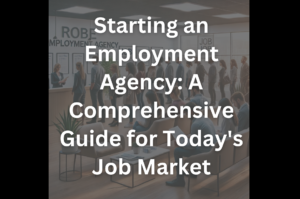**Disclosure:** We believe in honesty and transparency to the fullest extent. Some of the links on this blog are affiliate links, meaning, at no additional cost to you, we will earn a commission if you click through and make a purchase. This is one of the simplest ways you can support us.
Market Size and Trends:
The employment agency market is poised for significant growth, with a projected global value of USD 497.3 billion in 2023 and an expected Compound Annual Growth Rate (CAGR) of 5.3% from 2023 to 2030 (Grand View Research, 2023). This growth is fueled by several key factors:
- Rise of the Gig Economy: The gig economy continues to expand, creating demand for temporary and freelance work placements, which employment agencies are uniquely positioned to fulfill.
- Remote and Hybrid Work Models: The shift to remote and hybrid work has complicated traditional hiring processes, increasing the need for specialized staffing solutions.
- Skill Gaps and Talent Shortages: As industries face skill gaps, particularly in tech and healthcare, employers are turning to agencies to source specialized talent.
According to the projections by the U.S. Census Bureau, about 4.4 million boomers will turn 65 in 2024. And all boomers will be at 65 years old by 2030. This in turn also means that as boomers retire, the labor pool of industry-relevant knowledge and experience is anticipated to be depleted. Because these valuable skills are often difficult to replace, 2024 is expected to see the talent gap widen. Staffing agencies will need to innovate in talent sourcing and acquisition.

How Employment Agencies Work:
Employment agencies serve as a bridge between job seekers and employers, ensuring a seamless match between talent and job opportunities.
Here’s how they typically operate:
- Job Posting and Sourcing: Agencies post job openings across multiple platforms, including job boards, social media, and their websites. They actively source candidates through networking, referrals, and industry databases.
- Screening and Interviewing: Initial screening interviews assess candidates’ qualifications, skills, and experience. Agencies may also conduct assessments to ensure candidates meet the job’s specific requirements.
- Matching and Submission: Agencies match candidates with suitable job openings based on their qualifications and career goals. Resumes and cover letters are then submitted to the employer for consideration.
- Coordination and Communication: The agency coordinates all communication between the employer and the candidates, providing updates on the hiring process and managing any concerns.
- Placement and Follow-up: Once a candidate is placed, the agency facilitates the onboarding process and provides ongoing support to both the employer and employee throughout the employment period.
How to Get Started:
Launching an employment agency requires strategic planning and adherence to legal and industry standards. Here are the essential steps:
- Define Your Niche: Identify a specific focus for your agency, whether it’s industry-specific, job-type-focused, or based on skill sets. Specializing helps you target your efforts and stand out in a crowded market.
- Conduct Market Research: Thoroughly research your target market, including competition and industry trends. This research will inform your business strategy and help you identify gaps where your agency can provide unique value.
- Develop a Business Plan: Draft a comprehensive business plan outlining your agency’s vision, mission, target market, services, marketing strategy, and financial projections. A detailed plan will guide your business’s growth and attract potential investors.
- Register Your Business: Choose a suitable name for your agency and register it with the relevant authorities. Obtain an Employer Identification Number (EIN) and ensure you comply with all local and state requirements.
- Acquire Necessary Licenses: Depending on your location, you may need specific licenses, such as a Department of Labor license or a Professional Employer Organization (PEO) license. Ensure you meet all regulatory requirements before commencing operations.
- Set Up Your Business: Establish your office space, invest in essential software for recruitment and payroll, and create a professional website that showcases your services. Your branding should reflect your agency’s values and market positioning.
- Hire Qualified Staff: If needed, recruit experienced professionals such as recruiters, account managers, and administrative staff. Provide training to ensure your team is well-versed in industry best practices.
- Build a Strong Network: Networking is crucial in the staffing industry. Attend industry events, join professional associations, and cultivate relationships with potential clients and candidates.
- Market Your Agency: Implement a comprehensive marketing strategy that includes digital marketing, content creation, SEO, and traditional advertising. Highlight your expertise and success stories to attract clients and candidates.
- Ensure Legal Compliance: Familiarize yourself with employment laws, such as the Fair Labor Standards Act (FLSA) and Equal Employment Opportunity Commission (EEOC) regulations. Adherence to these laws is essential to avoid legal complications.
Conclusion
Starting an employment agency in today’s evolving job market is a promising opportunity. By understanding the current trends, implementing best practices, and following the necessary steps, you can build a successful agency that meets the needs of both employers and job seekers. Stay adaptable, provide excellent service, and remain committed to your agency’s growth and success in this dynamic industry.











[…] Be sure to check out our previous article that runs through how to start an employment agency! […]